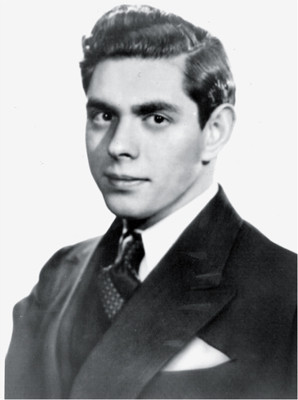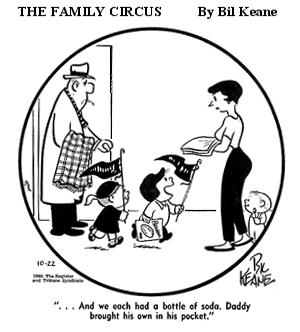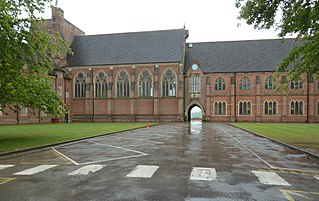A comic strip is a sequence of cartoons, arranged in interrelated panels to display brief humor or form a narrative, often serialized, with text in balloons and captions. Traditionally, throughout the 20th and into the 21st century, these have been published in newspapers and magazines, with daily horizontal strips printed in black-and-white in newspapers, while Sunday papers offered longer sequences in special color comics sections. With the advent of the internet, online comic strips began to appear as webcomics.

Joseph Shuster, was a Canadian American comic book artist best known for co-creating the DC Comics character Superman, with Jerry Siegel, in Action Comics #1.

The Family Circus is a syndicated comic strip created by cartoonist Bil Keane and, since Keane's death in 2011, is written, inked and rendered (colored) by his son Jeff Keane. The strip generally uses a single captioned panel with a round border, hence the original name of the series, which was changed following objections from the magazine Family Circle. The series debuted on February 29, 1960 and has been in continuous production ever since. According to publisher King Features Syndicate, it is the most widely syndicated cartoon panel in the world, appearing in 1,500 newspapers. Compilations of Family Circus comic strips have sold more than 13 million copies worldwide.

Elzie Crisler Segar, known by the pen name E. C. Segar, was an American cartoonist best known as the creator of Popeye, a pop culture character who first appeared in 1929 in Segar's comic strip Thimble Theatre.

Alfonso Williamson was an American cartoonist, comic book artist and illustrator specializing in adventure, Western, science fiction and fantasy.

Ginger Meggs, Australia's most popular and longest-running comic strip, was created in 1921 by Jimmy Bancks. The strip follows the escapades of a red-haired prepubescent mischief-maker who lives in an inner suburban working-class household. While employed at The Bulletin, Bancks submitted cartoons to the Sydney Sunday Sun, where he began his Us Fellers strip in 1921 in the "Sunbeams" section of the Sunday Sun. Ginger first appeared in Us Fellers on 13 November 1921, drawn by Bancks. When Bancks died on 1 July 1952 from a heart attack, Ron Vivian took over the strip (1953–1973), followed by Lloyd Piper (1973–1982), James Kemsley (1983–2007), and Jason Chatfield since 2007. In 2023, it was announced that the series would be discontinued.
Red and Rover is a daily syndicated comic strip by Brian Basset that debuted in 2000. Autobiographical in nature, Red & Rover is a retro-feel comic strip about the unconditional love between a dog and his boy that captures the spirit and flavor of the early-1960s to mid-1970s.
Fred Basset is a comic strip about a male basset hound. The cartoon was created by Scottish cartoonist Alex Graham and published first in the Daily Mail on 8 July 1963.

Abbie an' Slats is an American comic strip which ran from July 12, 1937, to January 30, 1971, initially written by Al Capp and drawn by Raeburn Van Buren. It was distributed by United Feature Syndicate.
Universal Press Syndicate (UPS), a subsidiary of Andrews McMeel Universal, was an independent press syndicate. It distributed lifestyle and opinion columns, comic strips and other content. Popular columns include Dear Abby, Ann Coulter, Roger Ebert and News of the Weird. Founded in 1970, it was merged in July 2009 with Uclick to form Universal Uclick.
Brian Basset is an American comic strip artist. Previously, he worked as an editorial cartoonist for the Seattle Times from 1978 to 1994, as well as being the creator and artist behind the syndicated comic strip Adam, later changed to Adam@home (1984–2009).
Andy Van Hellemond is a Canadian former National Hockey League referee and a member of the Hockey Hall of Fame since 1999. He is also a former municipal politician, serving on city council for the City of Guelph, Ontario from 2010 to 2018.

Nick Newman is a satirical British cartoonist and comedy scriptwriter.

William Woggon was an American cartoonist who created the comic book Katy Keene.
Bluey and Curley is an Australian newspaper comic strip written by the Australian artist, caricaturist, and cartoonist Alex Gurney.

David Collier is a Canadian alternative cartoonist best known for his fact-based "comic strip essays."
David Alan Parkins is a British cartoonist and illustrator who has worked for D.C. Thomson, publisher of The Beano and The Dandy. Now based in Canada, he illustrates children's picture books.

Canadian comics refers to comics and cartooning by citizens of Canada or permanent residents of Canada regardless of residence. Canada has two official languages, and distinct comics cultures have developed in English and French Canada. The English tends to follow American trends, and the French, Franco-Belgian ones, with little crossover between the two cultures. Canadian comics run the gamut of comics forms, including editorial cartooning, comic strips, comic books, graphic novels, and webcomics, and are published in newspapers, magazines, books, and online. They have received attention in international comics communities and have received support from the federal and provincial governments, including grants from the Canada Council for the Arts. There are comics publishers throughout the country, as well as large small press, self-publishing, and minicomics communities.

Thomas Lewis Skuce, more popularly known as Lou Skuce, was a Canadian comic strip and editorial cartoonist, who also appeared widely in movie theatres to entertain while producing cartoons that were projected onto the screen. He also worked in commercial illustration, owning his own studio serving advertising clients in Canada and the United States. During World War II, he also produced material that appeared in the Canadian Whites. When he died, he was referred to as "Canada's Greatest Cartoonist".
Celebrity comics are comics based on the fame and popularity of a celebrity. They are a byproduct of merchandising around a certain media star or franchise and have existed since the mass media and comics came into existence in the 19th century. Celebrity comics are usually not held in high esteem by critics, because of their purely commercial nature. They are solely created to capitalize on media trends and therefore published so quickly and cheaply that drawings and narratives tend to be of very low quality.










